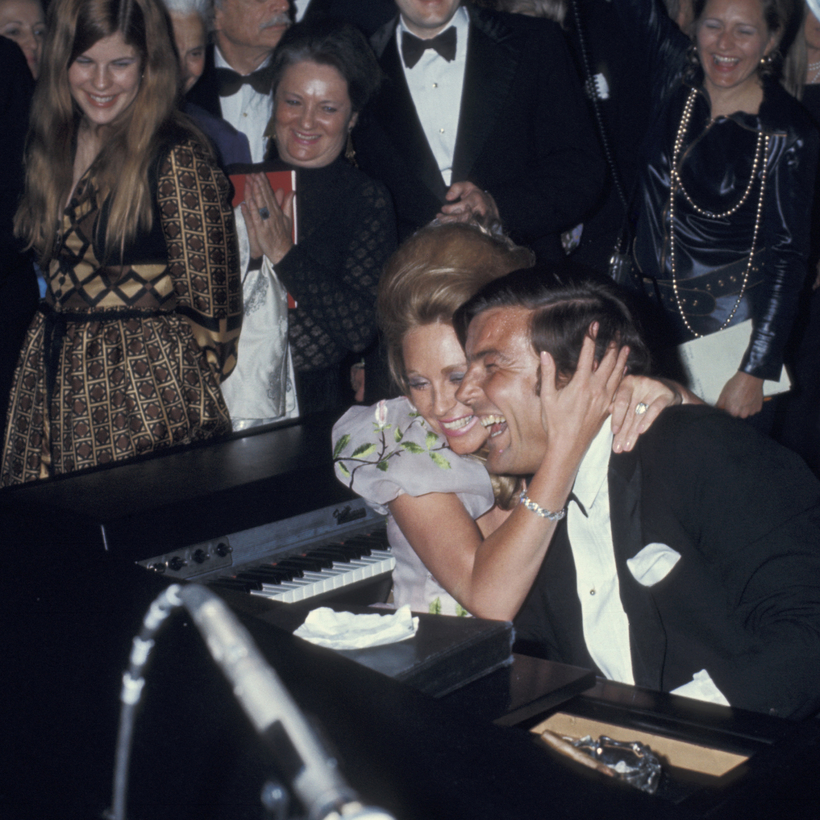Peter Duchin, the pianist and society bandleader, was headed home from a post-theater dinner in the fall of 2013 when the chest pains began. The diagnosis was a clogged lung, likely caused by a recent bout of pneumonia, and, in that laughable phrase, “routine surgery” was scheduled to clear the blockage.

But when Duchin awoke after the procedure, “I was caught in a nest of tubes and plastic bags, with wires attached to my fingers, my arms, my legs and my chest,” he writes in his new book, Face the Music (co-authored by Patricia Beard), a follow-up of sorts to his 1996 memoir, Ghost of a Chance. “That should have made it clear that something very bad was going on.” But “I wasn’t tracking much, except for the sound of a machine that constantly emitted an extremely irritating beep-beep just off A-flat.”
The very bad something turned out to have been a stroke. Thanks to rehab, Duchin, now 84, learned to talk again and to walk again (albeit with a cane). But despite intense physical therapy and force of will, he has regained only partial use of his left hand, a liability for someone in his particular line of work. For the previous 50 years, Duchin’s middle-of-the-road song stylings had pulled the highborn and those of high net worth onto dance floors at celebrations around the world.

Long and Winding Road
The stylish, valiant Ghost of a Chance chronicled Duchin’s efforts to make sense of himself and his singular life, equal parts privilege and pain. (More about this in a minute.) The bleaker Face the Music, which might just as well be called “Face My Mortality,” is, in part, an un-self-pitying account of Duchin’s health crises: a year after the stroke, he had a seizure, went into convulsions, and was put in a medically induced coma to prevent brain damage. Last year, he contracted the coronavirus and spent four months in the hospital, on a ventilator for 47 days.
But move through the procession of medical horrors, push past the dopey subheads and the filler—potted commentary about the meaning of glamour, speculation about the precise definition of society, and remembrances of swell parties and deb balls past—and a more compelling story emerges: Duchin’s efforts—the clock is ticking down; if not now, when?—to solve the puzzle that was his parents.

There was the mother he never knew, Marjorie Oelrichs, a New York socialite with Newport roots who died six days after giving birth to him in a shambolic but very fashionable private hospital above the soignée Colony Restaurant. (It was touch and go for Duchin himself; one of his lungs collapsed right after he was born, and he spent his first year of life in an oxygen tent.)
And there was the father he barely knew, cocktail Casanova Eddy Duchin, the dashing pianist and bandleader, son of Jewish immigrants, who went on tour promptly after turning over the care of his sickly newborn to family friends W. Averell Harriman, the chairman of the Union Pacific Railroad and future governor of New York, and Ave’s wife, Marie. Thereafter, until his death from leukemia in 1951 at the age of 41, Eddy made only cameo appearances in his son’s life.

Aside from panegyrics about Oelrichs from Cecil Beaton’s diary (“For all her integrity, loyalty, courage and sensibility, she was the best American girl I have known”), a few newspaper clippings, some photos, and scattered reminiscences from family members, Duchin did not have much to go on. When he happened on a rare-documents Web site selling a postcard from Oelrichs to her close friend the writer Anita Loos, he bought it for $240 and took it to a graphologist for a handwriting analysis. The verdict: Marjorie “projects a strong seductive vitality, exuberance and love of life.”
Eddy doesn’t come off nearly as well. He was “very self-absorbed, unpredictable, quick-tempered, inappreciative, always concerned about expenses,” recalled Duchin’s childhood nursemaid. But, she added, “he could be thoughtful and charming when he wanted to be.” (A good bit of this biographical detail appeared in Ghost of a Chance. Perhaps we should think of this as an encore.)

Would his parents have stayed together if they had lived, Duchin wonders. And what of his own bifurcated life as both hired hand and friend to the great and near great? (Jack and Jackie Kennedy, Ari Onassis, Walter Cronkite, Audrey Hepburn, Mary Martin, Truman Capote, and Bobby Short all come in for mention.) How would that have changed?
This much is certain: Duchin is a survivor. “I’m a firm believer,” he writes, “that, except in extreme situations, the job is to move on, take responsibility for oneself and get over it.”
In other words, don’t just face the music, people. Dance.
Joanne Kaufman is a New York–based journalist and critic

